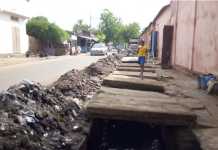In the mostly desert nation of Mali, environmentalists and government officials are concerned about the increasing amount of wood used, largely for cooking, in the capital, Bamako. If the trend is not reversed, the government predicts Mali will be consuming more than it can supply within the next three years, accelerating the advancement of the Sahara desert. Kari Barber reports from Bamako.
A spokeswoman for a local women”s alliance in Bamako explains how to use new, energy-efficient stoves her organization is promoting.
The women say the charcoal-burning stoves consume four or five times less wood than traditional stoves used in Mali.
The president of the alliance, Oumou Toure, says her group became involved in fighting deforestation because women are most directly affected by the decline of forests as they are the ones who typically buy and sell wood and use it to cook.
"Our constitution says that each Malian has the right to live in a healthy environment," Toure says. "What is happening today is that our environment is degraded, the natural resources are weak and women are having to deal with this."
The government has passed laws to protect certain species of trees against cutting and has suspended the export of wood from live trees.
Environmentalist Ibrahim Togola with the Mali Folke Center says despite government and civil society efforts, it is hard to halt wood cutting as long as poverty persists and wood is the only way for many to make enough to live.
"On one hand, wood represents a very easy access to income. ”Bamako needs wood, OK, I have a forest," Togola says. "You just need me to go cut the wood, there are trucks coming. I sell that wood. I get some cash. I can send my children to school. I can buy some clothes.” And it is easy, because it is there."
Togola says the problem with most of the alternatives introduced to reduce Mali”s wood consumption is that none are as cheap or as fast to cook with as wood.
He says there are also environmental changes happening that Mali cannot control.
"We have less and less rain," Togola says. "Before (there) was enough water so the forest could be regenerated by itself, and there were less people. With the [population] pressure, this is not possible. How are we going to live?"
Togola is working on a project to create ways for people to make money other than using wood, such as gardening and honey-making. He says the idea is that if fewer people are selling wood, the price will go up, making alternative energy sources more appealing.
Source: VoA News
“








